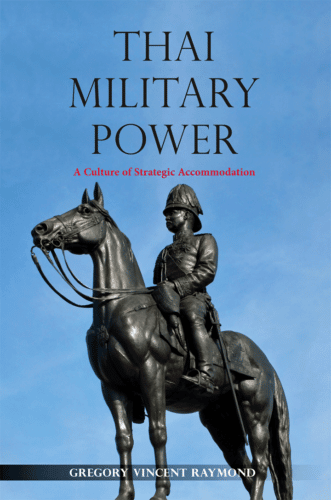
Book cover: Thai Military Power: A Culture of Strategic Accommodation
I am not telling you a secret when I say that the influence of the Thai army on the social and political developments in the country in the last century has been indispensable. From coup to coup, the military caste not only managed to strengthen its position but also – and this until today – to maintain its grip on the country's government.
However, despite the flexing of muscles at home and the first-class role of the military in the nation and society, the military capability of the Thai armed forces within the wider region has remained rather limited. And that is rather unusual. Australian defense specialist Dr. Gregory Vincent Raymond, who handled relations between the Australian embassy and the Thai army in Bangkok between 2005 and 2008, examines how this came about in this fascinating book.
The author is not entirely wrong in stating that the nationalist struggle against colonialism has been elevated to historical canon in the Thai collective memory. According to him, it is one of the factors that to this day determines the attitude that the Thai nation believes it should adopt in the international forum and that strongly influences its international relations. It is part of what the author describes as the strategic culture or strategic culture of Thailand. A term that he defines as 'public and shared symbols of narratives that concern matters of military forcewhich, according to him, consist ofthe politico-military mental models of history that decision-makers use to interpret the past and which limit thinking as to available policy options'. This culture, according to the author, is carried in Thailand by two military-political narratives that are based on and related to historical challenges to Thai national security and territorial integrity.
First, there is the lore related to the fall of the Siamese capital Ayutthaya in 1767. An event that is widely perceived as a historical trauma in the country to this day. In many Thai historicizing works, but also in popular culture with media such as comic strips or movies, the cause of the city's capture by the Burmese and the collapse of the kingdom is the lack of national unity. The lesson to be learned from this is that national security is a matter of priority for national unity under the supreme authority of the king.
A second story is that of King Chulalongkorn's European travels. When at the end of the nineteenth century it became clear that the Western great powers, especially France and Great Britain, had a greedy eye on Southeast Asia and the territorial integrity of Siam was threatened by their hunger for land, the reward of Siam traveled to the West to seek support there and to convince the European heads of state and governments of the fact that Siam was a civilized nation, equal to their own states and which therefore could not simply be colonized. Whether these 'goodwill' trips actually had any effect remains to be seen, but in the Thai collective memory where the memory of this monarch is cultivated, there is no doubt about that for a second. The lesson that Thailand learned from this story is that the country should rely not only on diplomacy, but also on a defensive apparatus that always responds to the circumstances.appropriate management of international relations' priority.
Based on three historical Cases namely the Thai military contribution during World War I, the Vietnamese invasion of Cambodia in 1978-1989 and the border conflict over Phrae Viharn plus an extensive analysis of the Thai defense budgets, the author investigates whether and how the Thai military caste honors the aforementioned principles. This book already shows that the Thai military is primarily focused on defense and has little sense for international adventures. A concept that I think will sooner or later have to be tested against the expansionism of the People's Republic of China. Incidentally, it is a curious fact that this book shows that in a recent survey of 1.800 Thai officers, a majority of them see a greater threat in the United States than in the People's Republic of China…
I found this to be an interesting book that is also a very quick read. In these times of growing geopolitical instability in the region, this book is a must for anyone interested in this issue. It offers a very informative insight into the power structure of the Thai armed forces and how they behave not only internationally, but also in relation to the society they are supposed to defend. It also leads to new insights into how military power serves broader socio-political and economic purposes and whether or not these are subordinate to the short- and long-term strategic concepts being devised in Bangkok.
'Thai Military Power: a Culture of Strategic Accommodation' is published by NIAS Press, Copenhagen, 2018 and distributed by Silkworm Books, Chiang Mai. The book has 304 pp. and costs 850 Bath. ISBN: 9788776942403


This book is definitely worth reading lung Jan, it is also in my bookcase. It clearly shows how the military is almost completely unaffected by foreign threats, but has tentacles and interests everywhere on a national level. At the moment I am reading “Infiltrating Society: The Thai Military's Internal Security Affairs” by Puangthong Pawakapan, released early this year via ISEAS (April-May 50% discount promotion). That is also about Thai defense and how that mainly concerns “internal national security”, with ISOC in particular. Did you know that the annual defense budget also has an item for Tourism, for example? The Thai army meddles in everything that has nothing to do with defense. All very special.
The FCCT (Foreign Correspondents Club Thailand) has also had several forums on this item, including:
- https://www.youtube.com/watch?v=OFcteKGlkZA about Thai Military Power
- https://www.youtube.com/watch?v=Ob9xq9tzOQo about Infiltrating Society